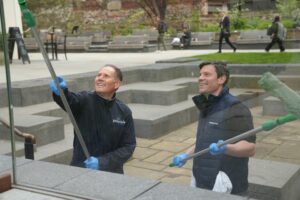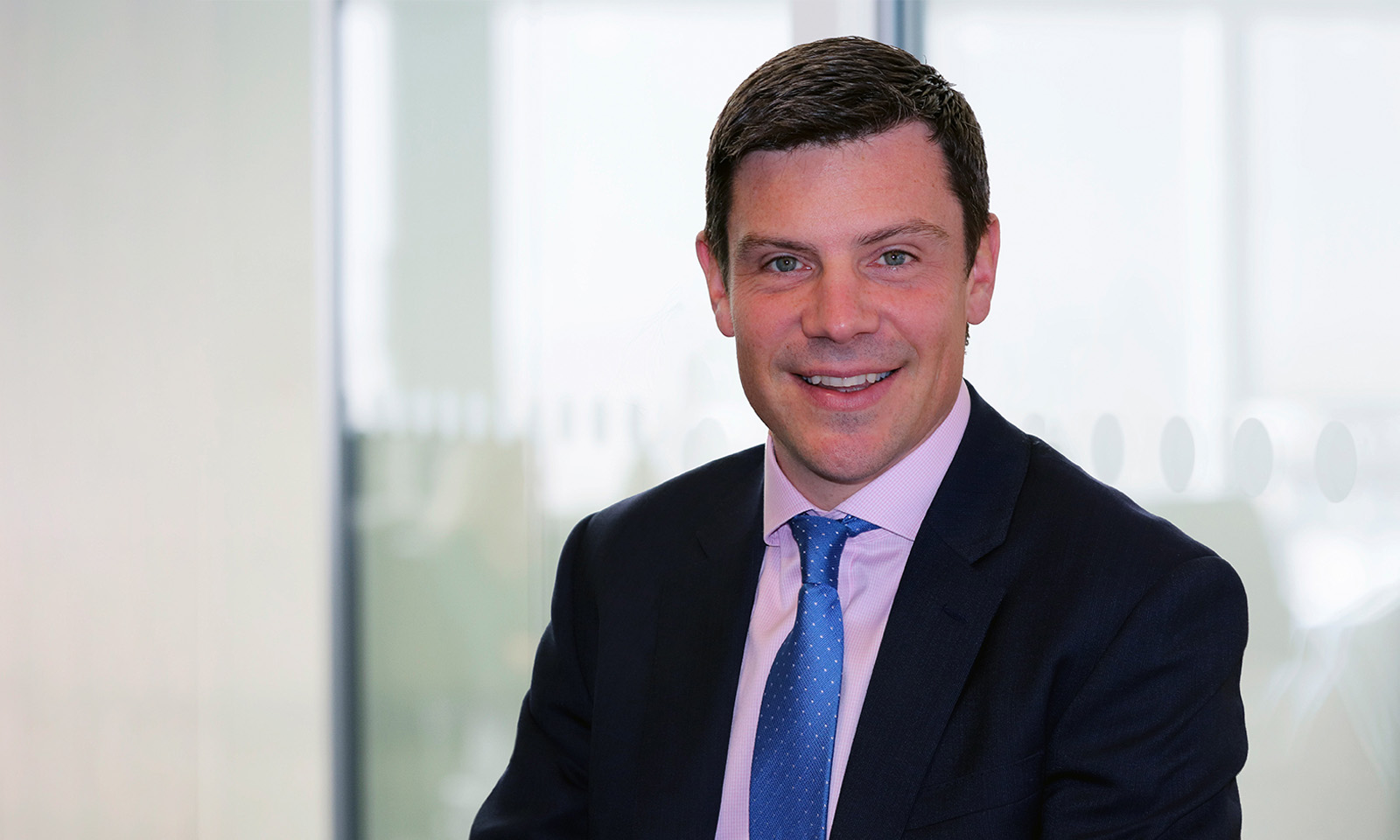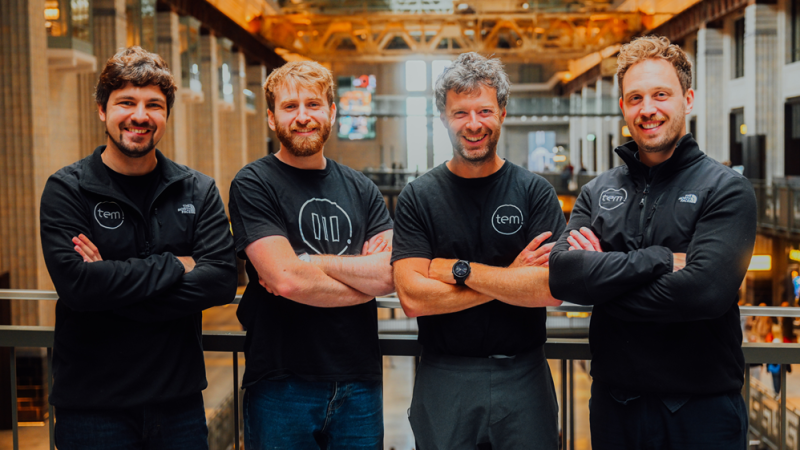This year Tom Lloyd became CEO of Principle Cleaning Services Ltd, taking over from his predecessor Peter Smith after seven-and-a-half years serving as the company’s Operations Director and Deputy CEO. Lloyd was taking over the company at a pivotal time, as the entire cleaning industry was in the midst of a paradigm shift.
Traditionally, cleaning has been done according to a pre-determined frequency. But as with many things, Covid changed all that.
“Buildings and offices are being used in new ways. People are constantly saying Fridays in London are dead,” Lloyd points out. “Through the use of smart sensors we actually now know how people are using buildings over the week. We know Friday’s the quietest and Tuesday, Wednesday and Thursday are busy, interestingly sometimes more busy than they were pre-Covid. People come and cram a few days of work into one day. We are seeing a huge shift in how people are using office space.”
This is not the first big change Principle Cleaning Services has seen. The company was founded 34 years ago by Douglas Cooke, as a cleaning company operating in London serving large managing agents, property owners, and the legal and professional sectors. Employing 2,400 people, the company has a turnover of £70 million, including £7.5 million from its in-house window cleaning division.
And perhaps surprisingly for a cleaning firm, it is a company that invests heavily in technology.
“For a number of years we have used technology in our window cleaning division, proving we are delivering what is agreed with our clients,” Lloyd explains. “We are using GPS to record which windows have been cleaned on large buildings which automatically updates to a portal for the client to view on a live 3D model of the building.”
Principle Cleaning has also been applying data collection technology to measure building occupancy.
“It allows us to make informed decisions around the frequency of cleaning,” Lloyd says. “We are moving to demand or needs-based cleaning, where we are using live data to direct us to certain key areas of a building based on usage, rather than at set times during the day.”
Cleaning in a Flexible Workplace
While offices are being more flexible with their staff, those same pressures mean Principle Cleaning needs to evolve, providing that flexibility to its own staff.
“We allow our teams to work flexibly at head office. With our on-site teams we have developed a system called hybrid-flex that allows our cleaners flexibility around their job,” Lloyd explains.  “We highlight tasks that can be done at different times of the day and allow cleaners to do those tasks at a time that suits them. It’s great we’ve had clients who embrace that.”
“We highlight tasks that can be done at different times of the day and allow cleaners to do those tasks at a time that suits them. It’s great we’ve had clients who embrace that.”
This is better for the cleaning staff, but it also benefits Principle and its clients, particularly during a time when the availability of labour is an issue across the board.
“We want to be the employer of choice, so if you’re going work in the cleaning industry, then you want to work for Principle,” Lloyd says.
This is because Principle has built itself a reputation on the fact that it takes real care of its staff. As Lloyd is quick to point out, “We are not selling a product, we are selling a service, and the way we look after, train and develop our people gives us a competitive edge.”
As a rule, the company promotes from within, with 70% of its management team having worked their way up through the company. It is not uncommon for people to stay with the company for 15 or 20 years, with an enviable staff retention rate of 95%, which correlates nearly with the firm’s 90% client retention rate.
“We have a fantastic reputation in London regarding our people and how we treat them, and regularly get approached by people wanting to work for us specifically,” says Lloyd.
The Next Step
But while that reputation is well earned, when Lloyd became CEO his first job was to take that to the next level. It had already been in the works for a while, but a month after Lloyd became CEO, it was announced that Principle Cleaning would become an employee-owned company.
“We have concluded a transaction that has enabled the majority of our shares to be held in a trust on behalf of our employees,” Lloyd explains. “If you are an employee of Principle, you are a shareholder. It is absolutely fantastic, and it has been so well received by our employees and clients. It puts us in a unique position. Companies want to deal with other companies that are people-centric and have a good story about them.”
The decision came at the right time as its founder and chairman, Douglas Cooke, approached his 70th birthday. Selling the company to a multinational or involving private equity would have meant huge changes for the business. But Lloyd believes employee ownership preserves what makes the company special, and gives it something to build on.
“It was around the preserving the legacy of the business Douglas started 34 years ago,” Lloyd says. “It has already led to productivity increases and better motivation, and those employees will get a share of the profits. It is refreshing, to be honest, in a world where lots of business owners keep the money for themselves.”
 With that change in ownership, however, came new oversight, new forms of governance, and new obligations.
With that change in ownership, however, came new oversight, new forms of governance, and new obligations.
“The shares are held by the trust on behalf of the employees, so there is governance that they expect,” Lloyd points out. “They are benign in terms of strategy but they do expect things to be done in the right way. You have to have the committees set up for remuneration, nomination committees, you have to be very strong in governance.”
Fortunately, these were standards that Principle was already attaining as governance has always been a key focus of the board.
“The really great thing about this scheme is that we can be very transparent. We get more employee engagement and more loyalty, Douglas can take a slight step back as an owner, and the business sees no change to its strategy or board,” Lloyd says. “We can’t see any downside, there are only positives for everyone involved in the business.”
That strategy includes a clear and defined five-year plan. For the foreseeable future, Principle intends to maintain its focus on London while continuing to grow, although the company’s window cleaning and specialist business is beginning to look for business outside of London.
“We want to keep focusing on our high-end, London-centric strategy that has served us really well,” Lloyd says. “We have been extremely successful doing what we are doing. We will tweak slightly, but we are staying on the right path.”






